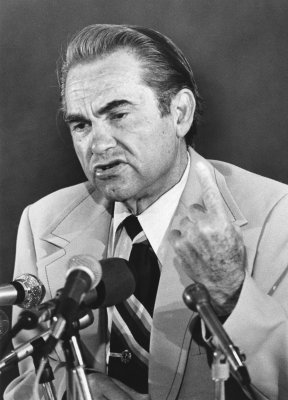Announcer: From Washington to Watts, the Civil Rights Movement progressed by legislation and demonstration. In Washington the Voting Rights Bill passed as federal voting registrars spread through the hardcore segregationist counties of the south demonstrations continued.
In the south Selma, Alabama was the focus of civil rights demonstrations. Microphones and cameras there recorded the violences as club swinging police broke up an attempted march from Selma to Montgomery, the State capital. Yet Alabama Governor George Wallace said...
George Wallace: "No one was hit on the ground in Selma, Alabama, not at all and only seven I think injured there enough to stay at a time in the hospital."
Pie Chamberlain: A Federal Court finally told Wallace to permit and protect the march. It was immediately after this five-day journey that white civil rights worker Viola Liuzzo was murdered. Ku Klux Klansman, Collie Leroy Wilkins was charged with the slaying. A first all of white jury deadlocked, a second acquitted him, then in Federal Court Wilkins and two other men received ten year prison terms for violating Mrs. Liuzzo’s civil rights.
Another civil rights worker, the reverend James Reeb of Boston was beaten to death. President Johnson said...
Lyndon Baines Johnson: "What happened in Selma was an American tragedy. The blows that we received, the blood that was shed, the life of the good man that was lost must strengthen the determination of each of us to bring full and equal and exact justice to all of our people."
Pie Chamberlain: The jury system of the south became the next target of the Johnson administration. As the President called for legislation...
Lyndon Baines Johnson: "That is clear in its purpose and specific in its aim and that aim is to prevent injustice to Negroes at the hands of all white juries."
Pie Chamberlain: Soon after this appeal, a white man was convicted of a racial murder by a southern all of white jury for the first time in modern history. Hubert Strange was found guilty of slaying foundry worker Willie Brewster.
The violence of Selma was eclipsed by an incredible week of full-scale of rioting in Los Angeles. The arrest of a Negro motorist touched off terrorism sniping, moving in the black ghetto called the Watts District.
Governor Brown had to call out the National Guard.
Governor Brown: "This tragedy is now being prolonged by hit-and-run hoodlums, terrorists. This is now a case of guerrilla fighting with gangsters. I want it clearly understood that the guard remain here in force until the streets of Los Angeles are safe."
Pie Chamberlain: Around the country in 1965 a new type of demonstration came of age. The protest for peace.
The demonstrators were mostly young people, and mostly the same ones who marched for Civil Rights last year. There were sit-ins on Capitol Hill and for the first time in history a sit-in at the White House.
It was also a year of familiar protest by labor against management. A maritime strike tied up east and gulf coast shipping, two aerospace strikes threatened the space program for a while. The New York papers were closed down again by a combination strike and lockout.
The biggest threat of all to industry was illuming steel strike. But President Johnson got both sides up to the White House and after a week of tough bargaining and presidential arm-twisting they settled. Legislatively the famous Texas twist was most in evidence. On Capitol Hill correspondent John Chambers reports.
John Chambers: So many members of the 89th Congress told President Lyndon Johnson their political life that the first session was his from beginning to end. What defense there was came primarily over foreign policy and a speech for Negro equality, the President made his most dramatic appeal to Congress.
Lyndon Baines Johnson: "On this issue there must be no delay or no hesitation or no compromise with our purpose."
Pie Chamberlain: Progress was slow but by summer the Voter Rights Law of 1965 was written and Mr. Johnson made a special trip one of severals for bill signings this one to the capital to sign the Voter Rights Law.
Before it passed the Congress voted to cut the excise taxes imposed during the Korean War. Congress approved the revolutionary medical care for the aged law. A hospital care plan financed under social security in a voluntary program.
The first session gave Lyndon Johnson a new Cabinet Officer to head a new housing in Urban Development Department. May did a federal crime to assassinate the President or Vice-President and ask the states to approve a presidential disability and succession constitutional amendment. and even gave Mrs. Johnson a treasure, the Highway Beautification Law. It went along with the dissevering of coins and had approved a complete change in immigration laws. Right up to the end President Johnson and House Republican leader Gerald Ford thought.
Unknown Speaker: "I feel that the Congress in 1965 in practically every instance is a rubber stamp to the White House. The Congress today, the legislative branch in Washington does not work its own will, does not exercise any independence. They are purely an adjunct to the executive branch of the government and as a consequence I fear in the long run the loss of freedom and the loss of some of the heritage of our American system."











